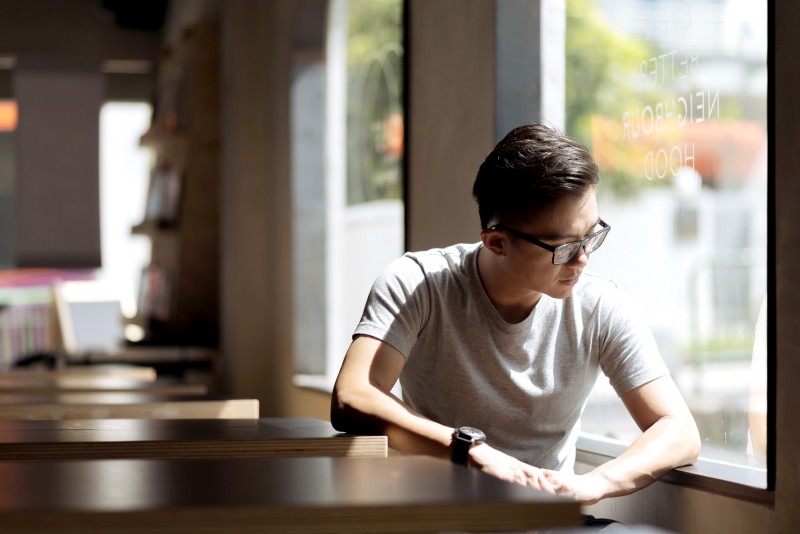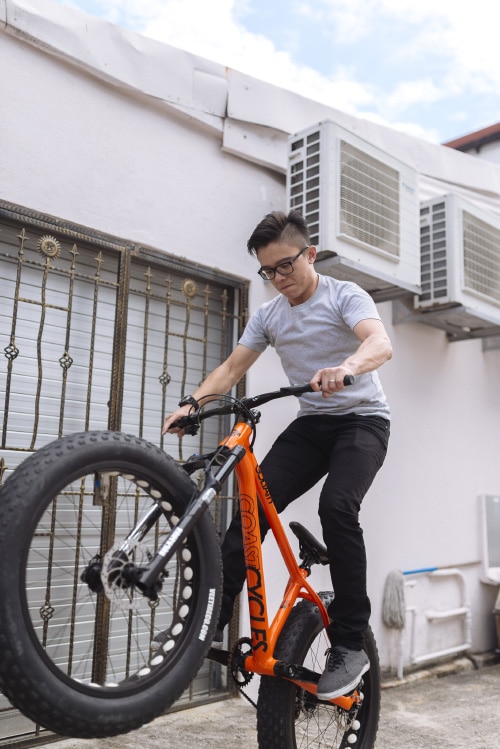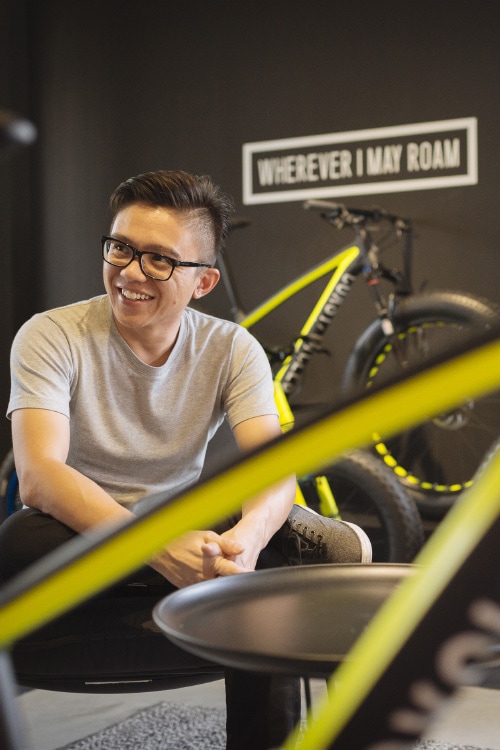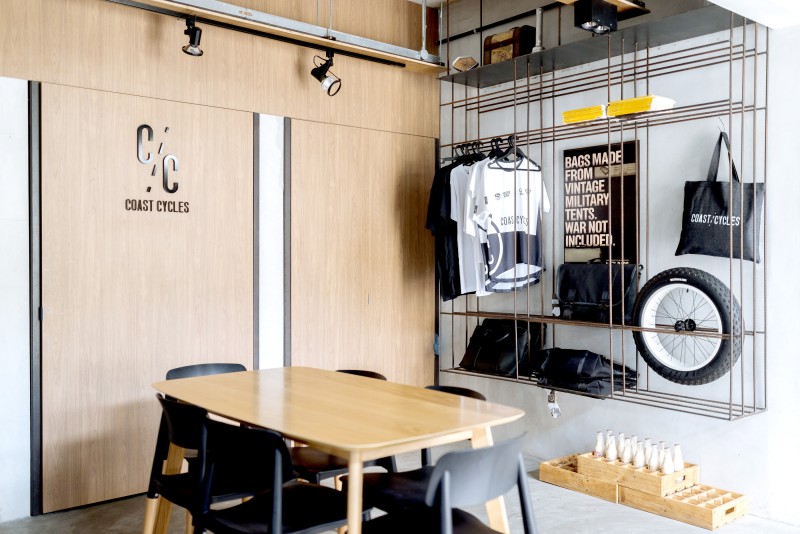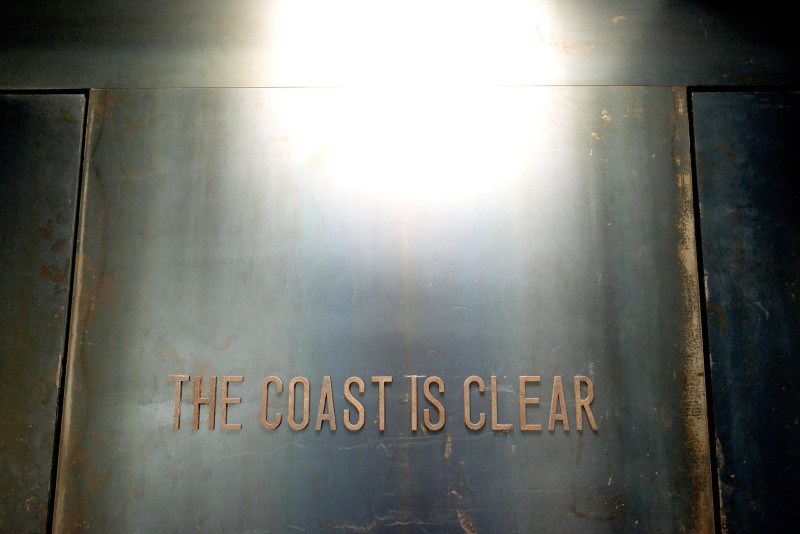Jansen Tan: Off the Beaten Track
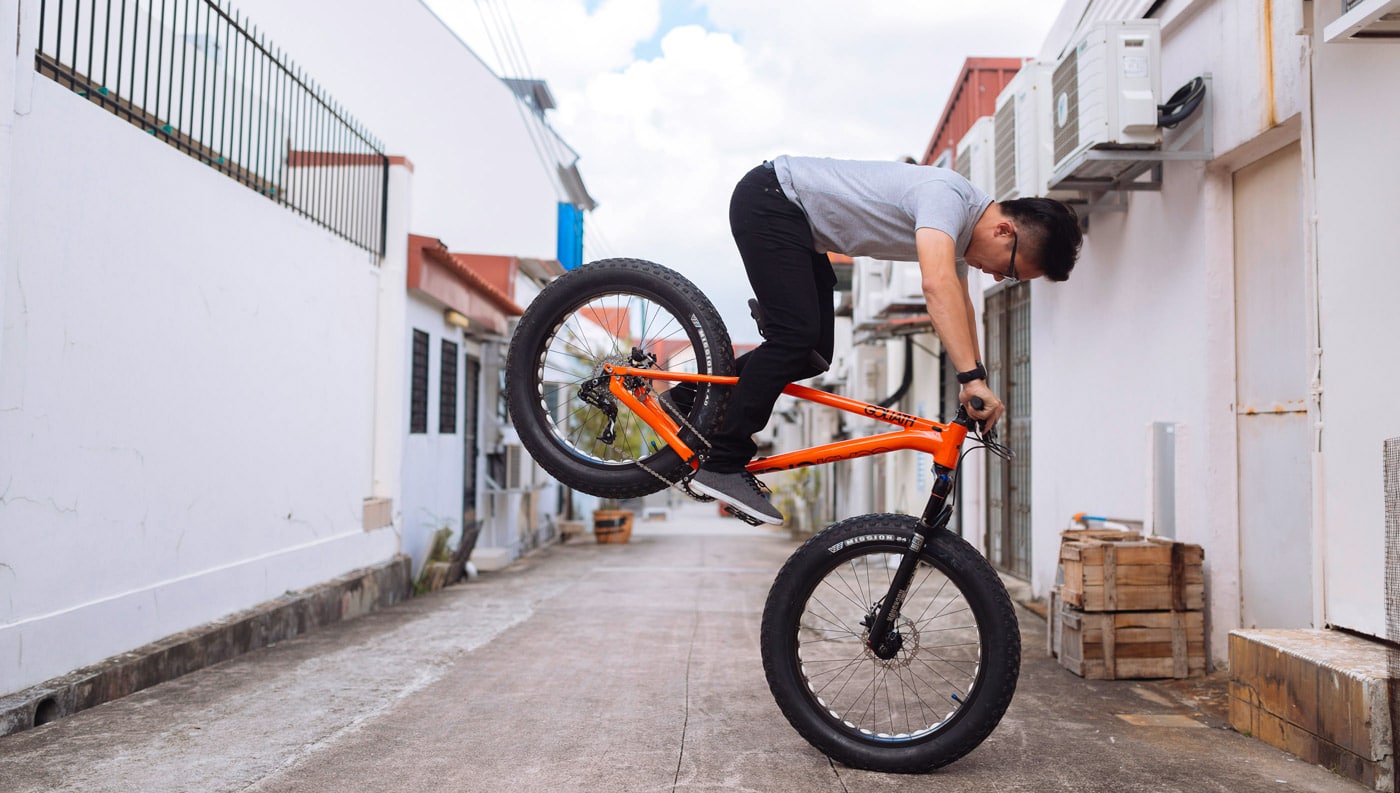
You may think juggling a family business and a cafe-cum-bike shop, as well as two young children would have taken its toll on Jansen Tan, and you’d be excused for thinking that, especially with his bloodshot eyes, and somewhat delirious speech. “Whoever wants to come, come lah.” he tells me with infectious nonchalance, when I ask about Coast Cycle’s clientele. The reason for his physical state however, isn’t a hangover or exhaustion. “I like working at night. After midnight, that’s when I start working,” he tells me. “When the kids are asleep, I finally have peace to do serious work.” He works till 4 a.m every day.
After making money from a property investment on a loan from his father, he acquired a unit along the Frankel Avenue enclave, which became Coast Cycles, a few short minutes from his home, on bicycle. “I went to my friends and said: “Okay! I’m going to start this crazy thing – a bicycle brand and a cafe together,” the ex-national cyclist and ex-motorsports enthusiast recalls. “Some of them took substantial risks to join me, so I’m very thankful for that.” He has since halted those pursuits, “A lot of the money that went into motorsports was just for personal glory. There wasn’t much meaning in it. I was doing it for my own adrenaline rush.” So he started designing bicycles, while managing Lamitak, the family’s business. “At least I might leave a mark on the bike industry,” he says of his current pursuit.
The cafe is spacious with bike maintenance situated at the back of the elongated shop house, and extends out to a back alley. The bicycle shop is housed upstairs, and is connected to an open-air veranda, which has plants for parapets. They drape the first-level of the store, creating a natural cooling mechanism for the young establishment. As I’m wandering around the garden, one of his staff shoos me back in, and not-so-sternly apprises me of the dangers of venturing outside. He locks the door.
Many times throughout our chat, Jansen expresses his appreciation for his father, who allows him to explore different interests, “which is very rare for a Chinese businessman.” The self-professed thrill-seeker gets bored easily, a trait he believes he acquired from his father. “I’m very lucky that my father allows me to do all these new, stupid things,” he proclaims unabashedly, with affection. The second-time father will now apply his own dad’s autonomous approach to his own kids: “Whatever they want,” he tells me, assured of the benefits of liberty. I ask what kind of values he hopes to instil in his progeny. “Just don’t steal my car,” he warns, well-aware of the futility of this wish, “I think they will… sooner or later. I took my brother’s car last time.”
YONG HUI YOW: Do your parents come down here?
JANSEN TAN: Yeah. My mum comes here now and then to get food.
YONG HUI: How about your dad?
JANSEN: He comes here to spot check. [laughs] I also have my Lamitak product meetings here. This place is how I want to work.
YONG HUI: How are things going?
JANSEN: We’re getting by.
YONG HUI: Why did you start the cafe?
JANSEN: It’s a combination of reasons. It started out as a bike brand. I was working at Lamitak when my brother left to start his Vegan Burger business, so I took over and ran Lamitak for about five years. Then, like my brother, I felt I needed to do something different. I started designing my own bikes, and from there, it led to a range of bikes. I felt it was important for the brand to have a space, for people to experience the brand. With the purchase of this space, that could happen. together with a cafe. My brother left the Lamitak stuff to me, but I cannot leave it to anyone else.
YONG HUI: How is Lamitak related to TAK Group?
JANSEN: TAK is the company, and Lamitak is one of the brands we have. In Singapore, we have about 100 employees.
YONG HUI: How do you juggle both sides?
JANSEN: Creativity-wise, this is better for me. Juggling both sides keeps my mind fresh because I can think of different stuff at different times.
YONG HUI: How did you start designing and producing your own bikes?
JANSEN: I used to cycle a lot, and competed actively from the ages of 16 to 21. I became very familiar with bicycles. When I was 21, I strayed off a bit, and went into motorsports. Five years ago, I wanted a very clean and sleek bike for city use. Riding a mountain bike or racing bike to meet my friends at a cafe feels weird to me, so I designed my own frame. After that, I felt the best way to move forward was simply to create a whole new bike.
YONG HUI: What was the process like?
JANSEN: It started off from sketches, and then I got someone to make the frame. That was the most tedious part. I travelled to Taiwan to find the right person. The range has expanded to eight bikes. They start from S$1000, all the way to S$9000, depending on the specifications.
YONG HUI: Did you give up competitive cycling for this?
JANSEN: No, I gave up competitive cycling for motorsports. Then, I gave up motorsports for this.
YONG HUI: How often do you cycle now?
JANSEN: Every week. In fact, I cycled here.
YONG HUI: You live around here?
JANSEN: Yeah, about 5 minutes away.
YONG HUI: Do you have favourite cycling trails?
JANSEN: I get bored easily, so I like to try different routes. Sometimes, I do street-riding, other times: trails, sometimes, mountain biking – except road bikes. I don’t like lycra, tights and all. It’s not my thing.
YONG HUI: How many bikes do you own?
JANSEN: About seventeen. I collect old bikes, those that I couldn’t afford when I was younger, so I only started collecting in my late 20s. I went out and bought all the bikes I couldn’t afford before.
YONG HUI: Do you plan to retail your bikes elsewhere?
JANSEN: We’re selling our bikes online to Taiwan, Australia and the US. This year, we are even exhibiting at InterBike Las Vegas, which is the trade show for bicycles.
YONG HUI: Is Coast Cycles more of a side project then?
JANSEN: No. It’s like having two kids. Both are important. It depends on how you juggle between the both of them.
YONG HUI: What is your ideal bike?
JANSEN: It depends on the day. For a girl, each day they have a different handbag.
YONG HUI: How were your growing up days like?
JANSEN: Since I was a kid, I’ve liked trying out new things and experimenting. I got bored easily. The most exciting and dangerous thing I’ve done was probably Motorsports. The moment I got my licence, I started trying out ‘funny’ things with cars.
YONG HUI: In Singapore?
JANSEN: Yeah, in Singapore. I was racing every other month.
YONG HUI: Where do you get your design influences from?
JANSEN: Basically, a lot comes from the old bike builders, brands which don’t exist anymore. Those bikes really appealed to me when I was younger. I was fascinated by their design, and their process of building the bicycles. Our bicycles are mass production versions of those bikes that don’t exist anymore.
YONG HUI: Are there any designers who inspire you?
JANSEN: Not so much individuals, but products. I’m inspired by many things: watches, cars, electronics such as Apple… and leather goods. I’m quite a random guy.
YONG HUI: What kind of person are you, aside from getting bored easily.
JANSEN: I’m stubborn. If I’ve an idea, and I really want to go for it, then I will make it happen. When I did this [Coast Cycles], it was a pretty unusual thing to do – to start a bike brand, then a cafe together with a bike shop at the same time.
YONG HUI: How did your parents raise you?
JANSEN: My father is a businessman, but the good thing is that he allows my brother, sister and I to always try out new things and make mistakes, which is very rare for a Chinese businessman. Like me, he gets bored easily too. He likes things which are out of this world. Like most parents, they have always wanted me to study well and all that, but in general, they just let me do my own thing.
YONG HUI: Will you be taking over TAK Group eventually?
JANSEN: I’ve never really thought about that yet, but I’m doing my best to make sure it’s in good hands.
YONG HUI: What’s the story with your red Porsche?
JANSEN: How did you find out about that?
YONG HUI: Did my stalking.
JANSEN: I flew this guy, Akira Nakai, down to do up my Porsche. He looks like a typical Japanese guy in his forties – family man, with three kids. You wouldn’t be able to guess what he does for a living. He is a solo guy on a mission. His job is to travel around the world to fix people’s cars. He is one of a kind, like a one-man cult.
YONG HUI: You paid him good money.
JANSEN: Yeah, and he works alone. I even documented the process. Nobody touches the car but him.
YONG HUI: Do you consider yourself very lucky?
JANSEN: Yeah, I think I’m very lucky. My wife is very nice and she is the most loving wife ever. My dad allows me to try new, stupid things. I’ve a successful family business that allows me to do these things… so yeah, I’m very lucky.
YONG HUI: Your eyes are bloodshot. Did you just wake up?
JANSEN: Yeah. [laughs] A typical day for me would be… I’ll come here at 10, or I’ll go to my office at Lamitak. I sleep at 4 a.m every night doing what I love. I work better at night when the kids are asleep. My friend in the US helps me with photographs and videos, so I talk to him in the wee hours.
YONG HUI: What are Lamitak’s plans?
JANSEN: My sister is at the helm of our expansion plans. We started expanding about 5 or 6 years ago into the region. We started our own offices in Malaysia and Thailand. We now have a Filipino and Indonesian distributor. Recently, we opened our own office in China. Our focus right now is to establish a stronger foothold in these markets.
YONG HUI: What kinds of clients does Lamitak deal with?
JANSEN: It’s a weird business. We work closely with interior designs, architects, and we try to communicate with home owners, but the person actually paying us is not the interior designer or the architects; it’ the property developer, contractor, or people who make furniture. It’s rather unusual. This is like me trying to convince her [points to PR executive] to get you [me] to buy a handbag for her. I’m trying to convince her to convince you that this handbag is the best, and that you should pay for it.
YONG HUI: Because she will be happy.
JANSEN: Yeah, but she’s not the who will be paying or staying in the house, and neither are you. It’s the consumer. So say I’m the home owner, and I want to buy a house, and you’re the property developer and she’s the interior designer. She will tell you that this is the best, the newest, and the trend that will appeal to me, and that you can sell more units.
YONG HUI: So the architects and interior designers take a commission?
JANSEN: No, they don’t, not in Singapore. It’s not allowed.
YONG HUI: Is the lamination business competitive?
JANSEN: There are a lot of competitors. We are not the only guys.
YONG HUI: What’s your market share?
JANSEN: That’s quite hard to determine actually. It’s not really tracked. It’s very hard to track this. They’ve never really done a survey.
YONG HUI: What do you want your kids to be?
JANSEN: Whatever they like man… whatever they like. Of course, it’s about bringing them up in the right way, so that they will have the right values.
YONG HUI: What are the ‘right’ values?
JANSEN: Politeness. Kids, at a very young age – they like to cry and scream at people. [grimaces] That’s not good. Other than that, they can do whatever they want – just don’t steal my car. I think they will sooner or later. I took my brother’s car last time. [laughs]
YONG HUI: You’re a carefree, happy person.
JANSEN: There are hundred and one things to worry about. It’s just whether you allow it to bog you down or not.
YONG HUI: What’s your philosophy towards life?
JANSEN: In my younger days, I played a lot. When I was cycling, I was able to travel for competition and all, to meet different kinds of people. When I went into motorsports, it was very much an individual sport. I competed in endurance racing, in drifting and all that. At the end of it, I realised it was just for personal glory, and there was not much meaning in it. I was doing it for my own adrenaline rush. A lot of money went into it for my own enjoyment. With this [Coast Cycles], at least I might leave a mark on the bike industry.
YONG HUI: Is that what drives you now – leaving a mark?
JANSEN: There’s always a purpose for all of us in this world. Thankfully, my dad allows me to try out different things. Participating in Singaplural… nobody that has a lamination business would do that. If you talk to a typical Chinese businessman without an ROI – he won’t entertain you.
YONG HUI: But it’s good publicity.
JANSEN: Yeah, I guess it is.
YONG HUI: How’s your mother like?
JANSEN: She’s a very supportive housewife. She was a core member at the beginning of the family business in the early 1990s. Back then, my grandfather’s business sold glue, construction materials and lamination. To cut the long story short, my dad felt they needed to change the business direction so there were disagreements, and he left to start his own company – TAK. Today, my grandfather’s business has streamlined to also do lamination.
YONG HUI: What is the mark you want to leave?
JANSEN: Nothing specific in mind. If I have an idea, and I can make something better, I’ll want to turn that idea into reality. It’s better than spending money on cars, and having them just parked there.
YONG HUI: But you love cars.
JANSEN: Yeah I do. I love anything on wheels. I like anything exciting.
YONG HUI: Speed?
JANSEN: Not so much speed… okay, yeah speed. I like the risk factor. But I’m just a typical, normal guy. I’ve got no fashion sense. Everyday I’m in black t-shirt or grey t-shirt.
YONG HUI: How are you like as a manager?
JANSEN: I regard them [staff] as colleagues, not employees, not staff. If you ask them, they’ll tell you how I’m like. My only job was working as a retail assistant selling bags and shoes. My uncle was the distributor of Dr. Martens in Singapore. At that time, it was really popular. That was the most happening thing to own. I helped him out, and part-timed at Isetan selling the shoes. Then, about 5 or 6 years later, the rights to the brand was bought over by Royal Sporting House.
YONG HUI: Sold it at a good time?
JANSEN: Yeah, I guess so. He made his money.
YONG HUI: What other brands are related to your family?
JANSEN: Another uncle did J-wear, and some other brands which are quite old – Kipling, Boy London, Yellow Cap… all these were the in-thing back then.
YONG HUI: Will you start your own apparel brands?
JANSEN: There’re a lot of things to do on the back-end, so step-by-step.
YONG HUI: What do you think of the other cafes? There are a lot of them.
JANSEN: Yes… it’s become an in-thing to do. At the end of the day, it’s about sustainability – who can last the longest, because rentals are not cheap.
YONG HUI: But you own this place.
JANSEN: Yes. Five, six years ago, I borrowed a sum of money from my dad to invest in a property. I bought a property and waited for about 2 years for it to be ready. Then I held it for a year, and wanted to move in. That’s then I got an offer for it. At that time, I was thinking of getting married and having kids. And if I wanted to do all these things [Coast Cycles], it’d better having my parents around to help take care of the kids, if not my wife will go crazy and go after me right? So, I decided to stay back at home and sell the property. With the profit, I bought this property. I sold it at the right time, before all the stamp duties came. I sold it almost at the peak.
YONG HUI: Did you foresee it?
JANSEN: It was luck, really. The place was just not ideal for my use.
YONG HUI: Where did you meet your wife?
JANSEN: At a motorsports event.
YONG HUI: Was she a racer?
JANSEN: No, she was just there at the event. It was held at the Police Academy.
YONG HUI: She likes racer guys like you?
JANSEN: No, she just happened to be there.
YONG HUI: Is she a policewoman?
JANSEN: No. [laughs] Just a passer-by.
YONG HUI: What’s Lamitak’s revenue?
JANSEN: It’s around S$30 or S$40 million annually. It is growing year-on-year. We are very lucky. Other numbers, I don’t know [laughs]. My responsibility is to spend money the right way.
YONG HUI: What is the future of the lamination industry?
JANSEN: It definitely will remain a relevant product. How I might want to do it differently – is to innovate in the way we sell lamination.
YONG HUI: What other applications are there for lamination?
JANSEN: We could create our own furniture. I’m in the midst of doing that actually, which may be a new brand, or it may not – I haven’t decided yet. It is a work-in-progress. It won’t happen this year though.
YONG HUI: Will Lamitak go public if you take over?
JANSEN: Nope. I don’t think so. We want to keep it within the family.
